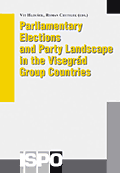Úvod »Právnické časopisy»Výber z rozhodnutí SD EÚ » Parliamentary Elections and Party Landscape in the Visegrád Group Countries
Parliamentary Elections and Party Landscape in the Visegrád Group Countries
Kompletné špecifikácie
The countries of the so-called Visegrád Group (V4) were already a relatively common topic in comparative political science in the 1990s. Not only are they close both geographically and in terms of their historical and political developments; a shared heritage of 40 years of communist rule meant that they (and other Central and Eastern European states) were experiencing a complicated and often painful threefold transition affecting their politics, economics, social structures and processes.
An attempt to address not only the consolidation of democracy in V4 countries but also the metadiscourse of research about them, this book presents an up-to-date and detailed map of the V4 party landscape in the years 2005-2006. Its purpose is not only to address issues relating to elections to the (lower chambers) of parliament in the countries of the Visegrád Group. The last section of the present book addresses the question of how consolidated those countries and their party systems are and suggests what implications there are for future research in the post-communist area.
In addition to Sarah Birch, the renowned expert on electoral systems and their impact on party systems, this book includes contributions by the following scholars: Roman Chytilek, Jakub Šedo, Maxmilián Strmiska and Otto Eibl (Czech Republic), Róbert Tardos and Zsolt Enyedi (Hungary), Artur Wolek and Andrzej Antoszewski (Poland) and Olga Gyarfášová, Vladimír Krivý and Marek Rybář (Slovakia). This line-up of contributors brings together experts from all the countries studied as well as from different disciplines: it includes comparative political scientists, experts on electoral studies and sociologists who study electoral behaviour and electoral alignments.The result is a compact overview and analysis of party politics and electoral behaviour in the countries of the Visegrád Group, which will be useful for further research on this topic and also for the comparative analysis of party systems and political systems in- and outside the post-communist group of countries.





